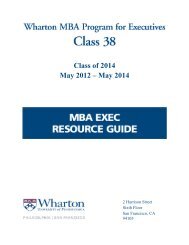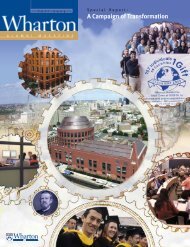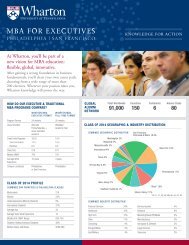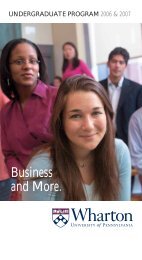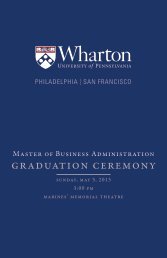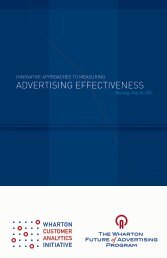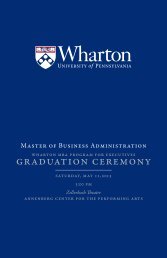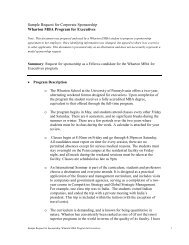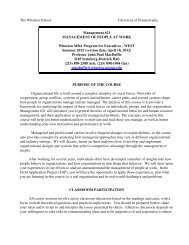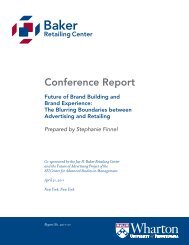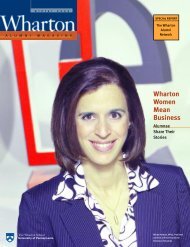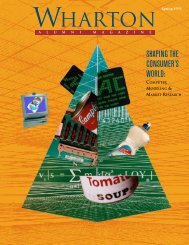Alumni Reunion - The Wharton School of the University of ...
Alumni Reunion - The Wharton School of the University of ...
Alumni Reunion - The Wharton School of the University of ...
Create successful ePaper yourself
Turn your PDF publications into a flip-book with our unique Google optimized e-Paper software.
“ <strong>The</strong>re are a lot <strong>of</strong> resources at GCP, but that is <strong>the</strong>back-up. <strong>The</strong>y want to see how you do on your own.”“If it entered <strong>the</strong> market and lost lots <strong>of</strong> money, that would beworse,” said Lodish, who noted that it does not affect his evaluation<strong>of</strong> <strong>the</strong> student teams if that is what <strong>the</strong>y prescribe for <strong>the</strong> client. “Thatis part <strong>of</strong> <strong>the</strong> game. If <strong>the</strong>y come up with a practical approach anddecide it isn’t worth it for <strong>the</strong>ir company, <strong>the</strong>n that is <strong>the</strong> answer.”It was a close call on that score for <strong>Wharton</strong> student Gil Dibner,WG’05, and his team advising a Chilean <strong>of</strong>fice supplies company.Although this multi-million dollar company has a significant share<strong>of</strong> <strong>the</strong> notebook market in its home country and already exports toseveral Latin American countries, it still sought <strong>the</strong> advice <strong>of</strong> <strong>the</strong><strong>Wharton</strong> team and its partners from <strong>the</strong> Universidad Adolfo Ibañezin Chile. Dibner said <strong>the</strong> ultimate advice <strong>the</strong> students gave wasnot completely negative, but that <strong>the</strong> company had to do better atdistinguishing its products to make any real inroad in <strong>the</strong> UnitedStates market.“It really was a great experience, since it is one <strong>of</strong> <strong>the</strong> few classesat <strong>Wharton</strong> where you get to integrate a lot <strong>of</strong> stuff,” said Dibner,who wants to be a venture capitalist after graduation. “It was an applicableand relevant fusion: market strategy, pricing, internationalwork, even finance.“And you are working with a client paying money, which ispretty relevant,” said Dibner. “You learn all <strong>the</strong> same lessons as ina classroom, but in <strong>the</strong> context <strong>of</strong> a high-effort environment. Thatadds to <strong>the</strong> stress level, but also to <strong>the</strong> relevance. People really care.We stayed up until 2 a.m. arguing <strong>the</strong> fine points because we wantedto see <strong>the</strong> final and best product. You get real-world experience,but with an educational context to reflect on it and talk about it.”Ellie Moss, WG’05, was most appreciative <strong>of</strong> <strong>the</strong> hands-<strong>of</strong>fpolicy <strong>of</strong> <strong>the</strong> Global Consulting Practicum staff. It was scary, in away, she said to be in Peru, where her group was trying to find waysfor a winery to get into <strong>the</strong> U.S. market. But on <strong>the</strong> o<strong>the</strong>r hand,that was <strong>the</strong> point—to have <strong>the</strong> experience <strong>of</strong> being on a real consultingproject.“<strong>The</strong>re are a lot <strong>of</strong> resources at GCP, but that is <strong>the</strong> back-up.<strong>The</strong>y want to see how you do on your own,” she said.<strong>The</strong> winery, one <strong>of</strong> <strong>the</strong> oldest in South America, markets productsthat are well known and well respected locally, but no one in<strong>the</strong> always experimental wine-buying market in <strong>the</strong> United Statesknew about it. Before she came to <strong>Wharton</strong>, Moss had worked asa director <strong>of</strong> operations for a translation company that focused onpharmaceutical and medical device instruction translations. She saidshe already knew from that how difficult and important languageand culture is in putting toge<strong>the</strong>r business propositions.“I speak Spanish and lived in Spain for a while, but I never hadto conduct business in <strong>the</strong> language,” she said. “It’s a whole new vocabulary,and even with that, you have to learn cultural differences.You are thrown into this situation and you have to learn quicklyto adapt. This is not just a grade. A client is depending on you foryour advice.”On top <strong>of</strong> that, she said, you have to learn how to work withyour own team.“Everything in business now is involved with groups, so youhave to get used to group dynamics,” said Moss, who after graduationintends to go into international development, primarily withfood policy, and probably in Latin America. “But toge<strong>the</strong>r, we got,I think, a good result, some ways <strong>the</strong> winery can position itself tocome to <strong>the</strong> market. It will be exciting to see if <strong>the</strong>y are successful.”<strong>The</strong> group consulting with Mercomujer, though,will not just be waiting around to see if <strong>the</strong> non-pr<strong>of</strong>it is successful.All <strong>the</strong> <strong>Wharton</strong> Global Consulting Practicum members havesigned on to continue consulting. It is <strong>the</strong> first time <strong>the</strong> practicumhas taken on a non-pr<strong>of</strong>it client, and Lodish said it will certainlynot be <strong>the</strong> last, though this and future non-pr<strong>of</strong>it projects will haveto be funded differently than <strong>the</strong> for-pr<strong>of</strong>it clients. In this case, <strong>the</strong>students on <strong>the</strong> <strong>Wharton</strong> GCP team had to raise several thousanddollars <strong>of</strong> <strong>the</strong> budget <strong>the</strong>mselves to help finance <strong>the</strong> Mercomujerproject (with GCP itself donating some in-kind services in researchand <strong>the</strong> like). This was no small feat, considering that GCP projectstypically cost $50,000 to $60,000.“We are not doing this to change <strong>the</strong> perception <strong>of</strong> MBAs as beingcapitalists, because that is what we are,” said Emily Lin, WG’05,one <strong>of</strong> <strong>the</strong> four <strong>Wharton</strong> students to team with a similar groupfrom <strong>the</strong> Universidad Del Pacifico in Peru for <strong>the</strong> project. “But wedid this to have something we feel good about doing.”Mercomujer, which focuses on women’s cooperatives, has a goal<strong>of</strong> creating more non-subsistence jobs for rural women in Peru. Italso wants to find ways to get <strong>the</strong>se women working at jobs that willget <strong>the</strong>m closer in wages to working men in <strong>the</strong>ir particular regions.<strong>The</strong> project <strong>the</strong> Global Consulting Practicum team worked on hadwomen in several villages spread out through Peru hand-makingknitted dolls and o<strong>the</strong>r somewhat sophisticated paper and clothitems. Most <strong>of</strong> <strong>the</strong> women also had family and farming duties, so<strong>the</strong>ir work hours were inconsistent, most <strong>of</strong>ten depending on when<strong>the</strong>y were needed o<strong>the</strong>rwise by <strong>the</strong>ir families. <strong>The</strong> products <strong>the</strong>mselves,said Lin, were good, but Mercomujer could never quite get aconsistency in inventory or know exactly when <strong>the</strong> workers wouldshow up.“That is a real challenge with a non-pr<strong>of</strong>it that we learned,” saidLin. “You have to get <strong>the</strong>m to think like a business. You spend anawful lot <strong>of</strong> energy with a non-pr<strong>of</strong>it that way which you probablywouldn’t with ano<strong>the</strong>r kind <strong>of</strong> business.“But <strong>the</strong>n, you are not only analyzing things, but working witha cause,” she said. “What was interesting is that <strong>the</strong>re was a nexusbetween environmental concerns, women’s concerns, business,and a host <strong>of</strong> o<strong>the</strong>r things. McKinsey and o<strong>the</strong>r firms do pro bonowork, sure, but here you are out <strong>the</strong>re making a difference.”In <strong>the</strong> end, <strong>the</strong> GCP students advised Nolte and Mercomujerto concentrate on <strong>the</strong> high-end and “organic” market in <strong>the</strong> UnitedStates. <strong>The</strong>re are a lot <strong>of</strong> buyers <strong>of</strong> crafts, <strong>the</strong>y said, who look fornatural fibers and things made by local artisans for gifts or showitems. In addition, <strong>the</strong> students also tried to show Nolte and herContinued on page 3322 . S U M M E R 2 0 0 4 . T H E V A L U E O F E X P E R I E N C E




